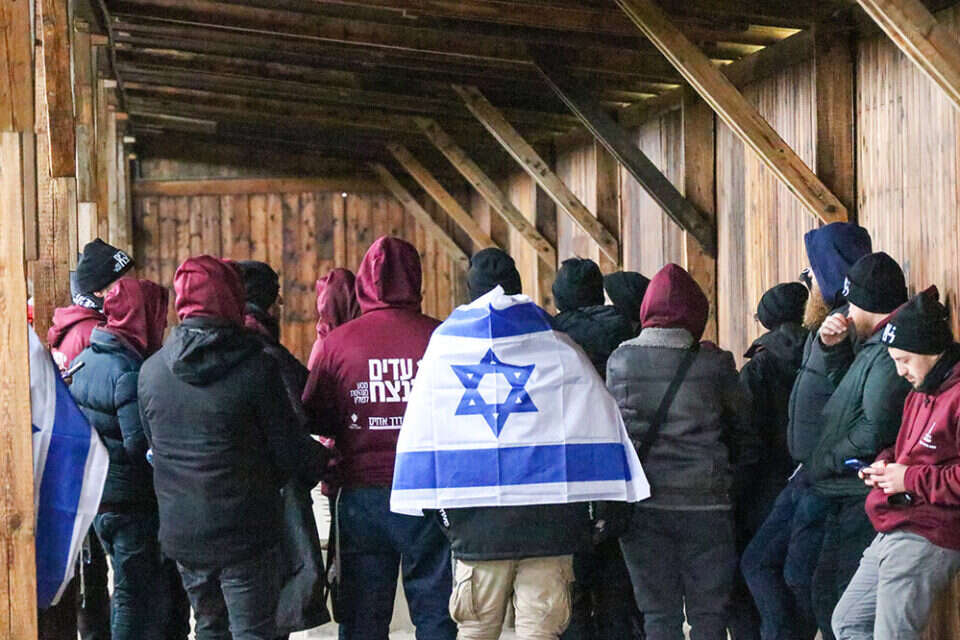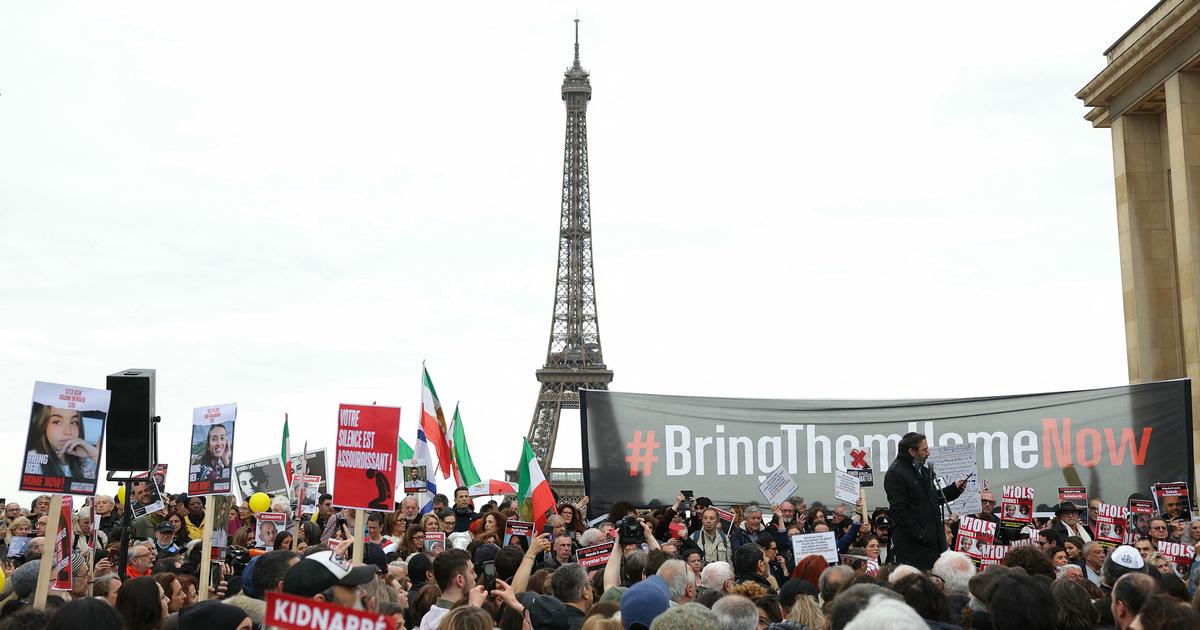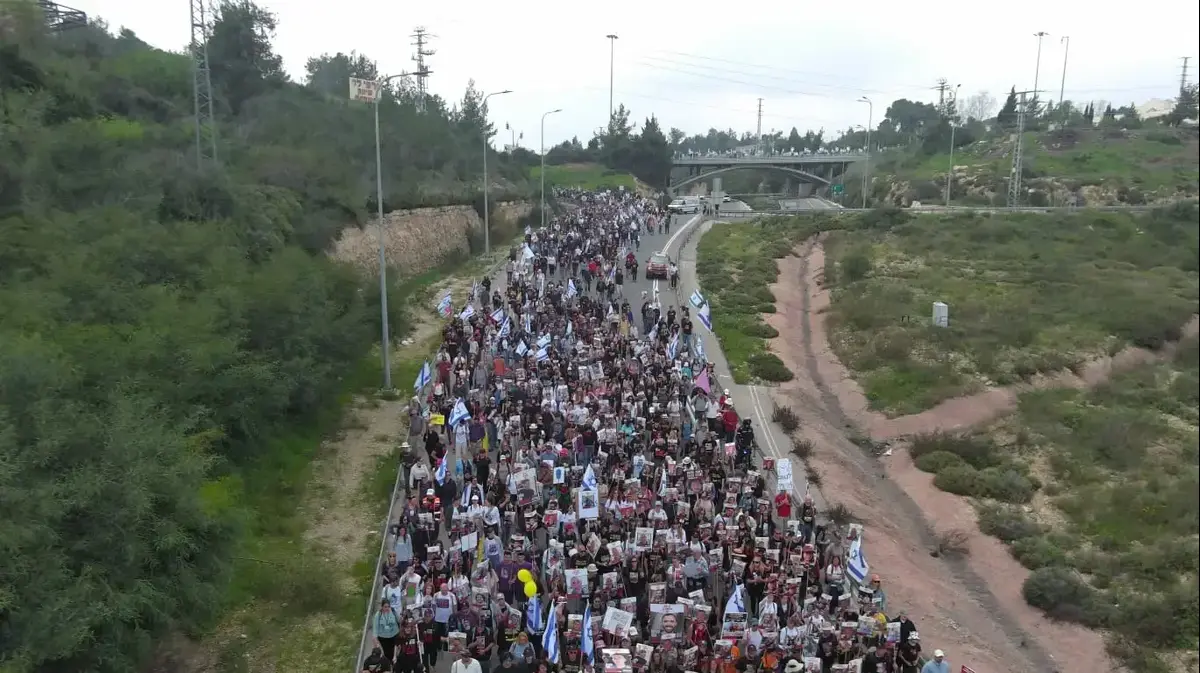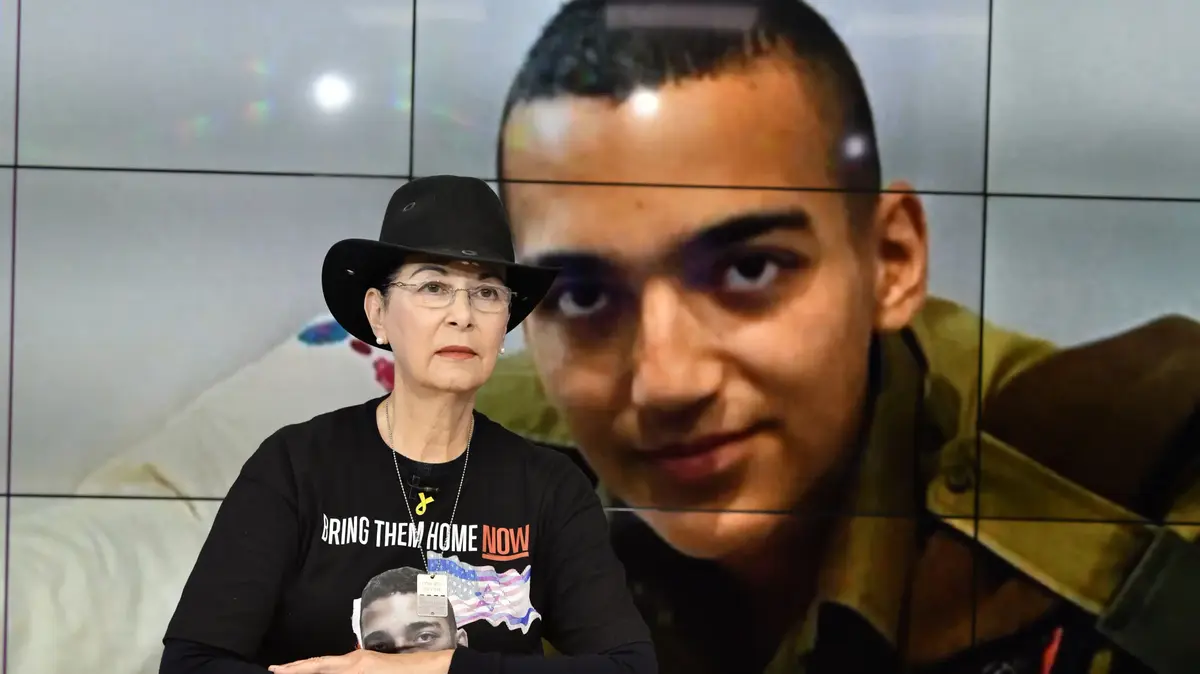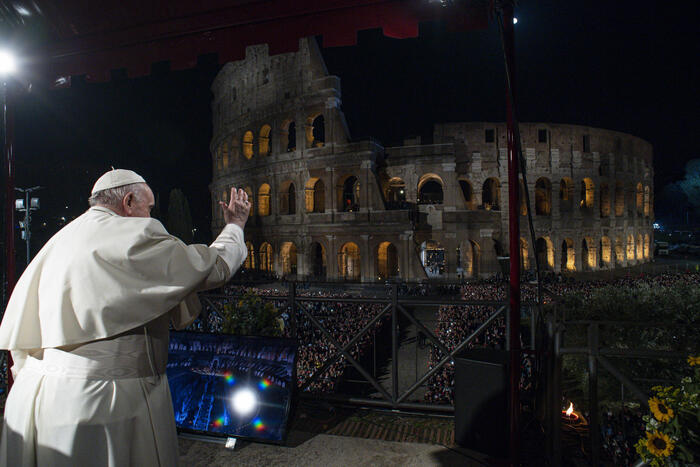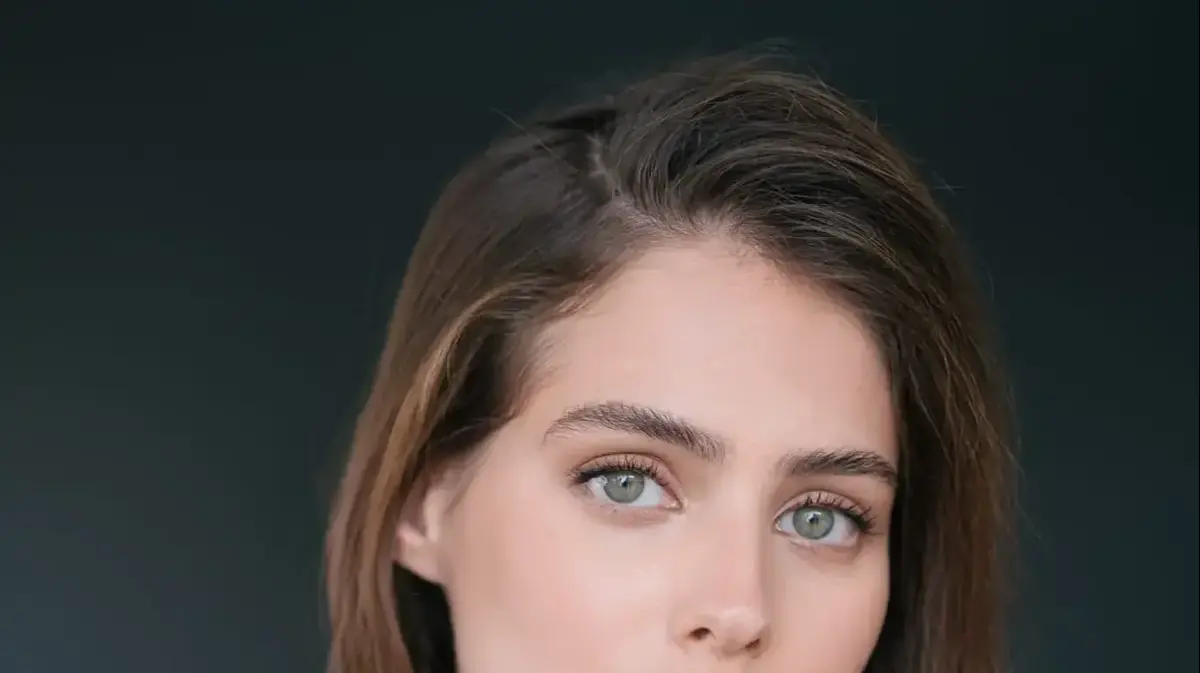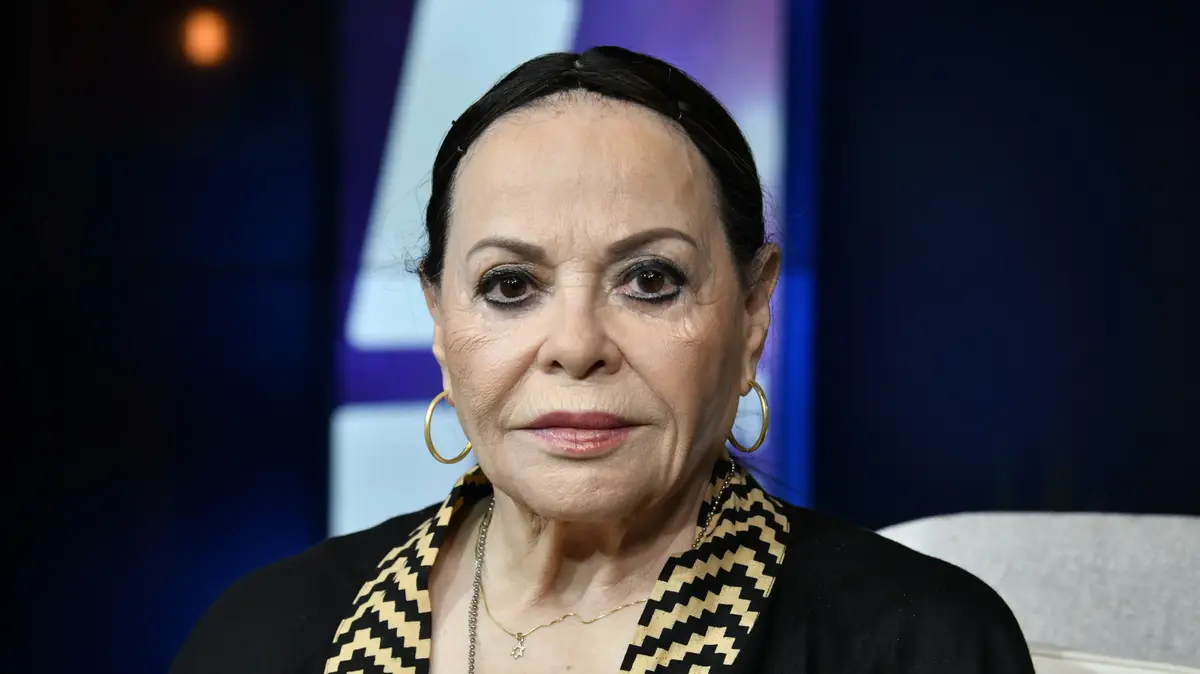"I did not dream, I did not imagine that it would hurt me like that," Yehuda Shapira broke down in tears next to one of the death pits in the children's forest in Tarnow.
"I was asked before the trip if I had a relative who was murdered in the Holocaust and I said no. Today I know that six million of my brothers were killed in the Holocaust and I connect with each of them. Our duty is to make sure that never again."
Shapira was born and raised in Har Nof to an ultra-Orthodox family, served as a soldier in the Kfir Brigade and currently lives in the Kiryat Moshe neighborhood of Jerusalem.
He is 29 years old and the father of three children, and is in charge of the lone soldiers in the Nahal Yehuda organization of the ultra-Orthodox Nahal. unrecognizable.
This week, following the Holocaust, about 40 people set out last week, most of them former fighters in the Netzach Yehuda Haredi battalion who still serve in active reserve service.
Everyone came back completely different.
"It is a pity that I did not make this journey before military service, I am sure I would have received more meaning for the service," said one participant, moments after we finished hearing under heavy snow about the atrocities that took place in the Chelmno extermination camp.
The local Poles looked in amazement at the group of young people who roamed proudly with the flags of Israel, and of course with the flags of the battalion, in the extermination camps of Majdanek, Auschwitz, Birkenau and Chelmno, as well as on the streets of Warsaw, Krakow and Lodz.
But no one in the group cared what was thought or said about him.
The person who initiated the trip, the second in number, is Yossi Levy, CEO of the Netzach Yehuda Association. Levy was born in Jerusalem, educated in ultra-Orthodox institutions and later served in the Netzach Yehuda Battalion as a soldier, commander and infantry officer, .
He is currently a major in the reserve.
"The average secular boy goes to Poland in high school, and even if he does not go, he goes through trainings, lectures, preparations and conferences," says Levy.
The rift between the ultra-Orthodox and secular public is growing, and we - the ultra-Orthodox who serve in the army - are the ones standing on the bridge. The Holocaust is an integral part of this connection that needs to happen. The ultra-Orthodox sector has no real Holocaust involvement Public awareness. "
Yehuda Farber (29) from Mevaseret Zion, who served as an officer and a regular in the regular service in Yehuda Yehuda and is currently a lieutenant colonel in the reserve, also embarked on the same journey.
"I've read books over the years, but only now do I understand and feel what happened to the Jews in the Holocaust," he says. He gave me proportions for life. "
"Blood Revenge" near Mount Ash
The memory of the Holocaust has never been strong in me.
At the yeshiva and school we were not taken to Yad Vashem, in my immediate family there were no murdered nor survivors who could tell up close, and it all came down to a few books and movies that I got to read and watch over the years.
This is why when the alumni organization 'Derech Ahim' on behalf of the Netzach Yehuda organization initiated the 'Witnesses Forever' campaign, I jumped at the opportunity.
One of the most exciting moments of the trip took place in the gas chambers of the Majdanek camp, when the group began to sing "I Believe".
Some members of the group sat down on the floor, and some stood around them.
It was raining heavily outside, and the cliché "the sky is crying with us" has never been more true.
In those very moments one could imagine how the Jews were led naked, humiliated and helpless to their cruel death, and the tears flowed spontaneously.
Then, when we got on the bus, I heard one of the group members ask the military rabbi, Yitzhak Deutsch, "How exactly in such a place, where Jews were mass murdered and apparently did not see the Supreme Providence at that time, can one sing 'I believe in complete faith'?"
At that moment one of the guys intervened and said, "I have never felt such a strong faith as in those moments."
I could not help but agree with him.
In general, from singing "I believe" in the gas chambers to the opening prayer that echoed between the treetops in the children's forest - throughout the week there was a feeling of something special in the air.
When I read Rabbi Deutsch's request for chapter one of the Psalms near the Ashes Mountain in Majdanek, I felt that the words "Vengeance the blood of your shed servants" seemed to have been created for these moments. The feelings I experienced in those moments were the most powerful and moving in my life.
Another shaky moment in the journey was in the late hours of Tuesday night.
We arrived at a hotel in the town of Auschwitz near the Auschwitz extermination camp, which we were scheduled to reach the next morning.
We were after a busy and mentally exhausting day, which began with the tomb of Rabbi Elimelech of Lizhensk, continued in the children's forest and ended in the Jewish ghetto in Krakow, all accompanied by long hours on the road.
Despite the fatigue we gathered for a summary and wake-up call in the hotel lobby, where we sat until the wee hours of the night.
The emotion and tears that erupted during the conversation left a strong impression on all the participants.
The "old man" in the group was Benzi Rover from Kfar Chabad. 42 years old, father of six children, one of the first to enlist in the Haredi battalion and currently a Sarsap in the reserve. During the conversation he said he never thought these would be the feelings he would experience, and in a conversation with him after returning to Israel he said: "It was not an easy journey. I did not think it would affect me so much. Every day was a kind of emotional roller coaster. I did not expect to go through what I went through. It was a shaky journey. I returned home on Thursday, and on Saturday I cried in front of the children while reciting the Kiddush. My children understood where I was going, but did not understand how much it affected their father. I stopped several times during the Kiddush, "There and their lives were cut short. For years I wanted to make this journey and I did not get the chance, and now I recommend to every one of my friends to do it. A person who has not been there will not understand."
Do you want your children to go through this journey?
"Unequivocally yes. The only question is at what age should they go there."
Farber also agrees: "Of course I want my child to make this journey."
Derech Ahim and Netzach Yehuda are already planning to organize several trips for the battalion's graduates each year.
"The goal is for the graduates of the tracks to have the opportunity to go through the experience, which in my opinion is a must for every Jew and Jew," says Goldstein, and Levy adds: The battalion, because for me, exposing the entire sector to what the Jewish people went through in the Holocaust is a lofty goal. "
Photo: Paul Stecura,
Basic suspicion
Aharon Finkelstein has already participated in dozens of trips to Poland, in some he accompanied delegations of officers and soldiers as a military rabbi and in others on a travel guide standard, after passing the Yad Vashem Instructors' Course. He accompanied this journey as a guide, and he said it was a precedent-setting experience for him. "There were some very special things," he says, "there was a relatively older public compared to the average age on other trips, some even fathers to children, all military graduates, most of them warriors. It's a different attention, different questions, a different emotion. A father coming to the children's forest treats It's different from a 16 year old guy who comes here, and you felt it every moment.
"The second thing is the strong faith character that was in the journey - the songs, the outpouring, the strengthening, it stood out very much. "To other places and new sites. The clock did not 'speak' at all in this journey. I have not had such things. You do not feel the fatigue, because when you have the 'why' you are able to go through any difficulty."
Sought to survive.
Suburb, Photo: Paul Stecura
One of the things that stood out during the trip was the relatively low awareness of the Holocaust, which was among the participants. It's hard to blame them. Tours at Yad Vashem are not an integral part of the curricula in ultra-Orthodox schools, films are not always within reach unlike high schools in the secular public or even in the national-religious sector, yeshivas and kollels do not organize trips to extermination camps. Those who have close Holocaust survivors in their immediate family are more aware of the issue, but as the years go by, it also diminishes.
Nava Weiss, head of the Haredi section at Yad Vashem, adds in this context: "Awareness of the Holocaust has always been in the Haredi public, it exists, but sometimes there is room for improvement in knowledge. Indeed, I can say that when we come to deliver lectures to children and young people in public The ultra-Orthodox - they connect immediately, which does not always happen in the general sector. "
According to Weiss, the differences lie in the approach: "Many of the ultra-Orthodox have suspicions about Yad Vashem and other symbols of the state, such as the customs on Holocaust Remembrance Day. Regarding travel to Poland, there is controversy about their effectiveness at a young age. And increasing knowledge, but it is not certain that a trip in high school is always good, because such a trip should come on a certain basis that does not always exist among the young. "
"It's hard to catch without being here."
The delegation in Poland, Photo: Paul Stecura
Weiss says that in many cases, ultra-Orthodox girls have a greater awareness of the issue of the Holocaust than boys in the ultra-Orthodox sector, and often even more than girls of the same age in the secular public.
Finkelstein, who, in addition to being a travel guide, also runs the Ibschitz Institute in Haifa for the study and teaching of the Holocaust, says that "in the past, groups from ultra-Orthodox girls' institutions would come, but in recent years these visits have decreased."
Another interesting division that Weiss points out shows that the Hassidic communities have a greater awareness of the Holocaust than the Lithuanian public.
However, it is told of one of the most important rebbe of our generation who told his followers that it is better to deal as little as possible in that dark time, as this preoccupation will raise questions and perplexities about belief in the Creator of the world - unanswered questions.
"All these years I have grown up believing that the best commemoration for those killed in the Holocaust is reciting Kaddish for the upliftment of their souls, studying Mishnayot and observing mitzvos with elegance," one of the participants in the journey, who was born and raised in a distinctly ultra-Orthodox neighborhood in Jerusalem, told me.
Travel to know more
For Weiss, the solution is to "bring into the subject the 'we', the glorious ultra-Orthodox communities that were wiped out, the Admors and Torah scholars who were murdered in the Holocaust or even those who survived.
This connection will surely significantly increase the sense of belonging and the desire to know more.
What ultra-Orthodox would not want to know what happened to the great men of the Torah and the Tzaddiks during the war? "
The person who undertook to make a change in the issue is Asher Leibel, CEO of Dorot, a company that organizes strictly kosher content campaigns for the ultra-Orthodox public in Poland and other Eastern European countries, most of them Holocaust victims.
According to him, in recent years he has been organizing every year 30-20 trips of ultra-Orthodox groups to camps in Poland, which include visits to the graves of the righteous.
Each group has between 20 and 50 passengers.
"When I started the business a few years ago, I went to Poland and studied the area and realized that this is something that is very much lacking in the ultra-Orthodox sector," says Leibel, who insisted on joining the reservists' journey ("because you want to be part of this thing called Netzach Yehuda" It is very common to go to the tombs of the righteous, but they have hardly touched on the Holocaust aspect.
"In recent years there has been an increase in travel to camps in Poland, firstly due to the drastic drop in flight prices. Secondly - you used to walk the streets and feel more 'in the Holocaust', whether it's the servant at school or the old man in the synagogue corner, who were survivors. "Those who want to know just have to go there to learn about what happened. The combination of traveling to the camps with the tombs of the righteous and the option to get strictly kosher food everywhere and all the accompanying services - like a mechanical key in the hotel on Shabbat - help the ultra-Orthodox travel more easily."
Were we wrong?
Fixed!
If you found an error in the article, we'll be happy for you to share it with us

